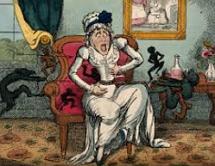Before entering fully into the definition of colic, it is necessary to proceed to know its etymological origin. In this case, we can emphasize that it is a word that derives from Latin, specifically from "colicus", which comes from the Greek "kólikos", and which was used to refer to someone who had problems in the colon.
The first meaning that the dictionary of the Royal Spanish Academy ( RAE ) recognizes of the term colic refers to what is linked to the colon . It should be remembered that the colon is the sector of the large intestine of mammals that ends where the rectum begins.
 The most common use of the concept is related to colicky pain . Colic, in this sense, is a discomfort in the area of the intestines that can be very intense, causing cramps and sweating and sometimes accompanied by bowel movements and vomiting .
The most common use of the concept is related to colicky pain . Colic, in this sense, is a discomfort in the area of the intestines that can be very intense, causing cramps and sweating and sometimes accompanied by bowel movements and vomiting .
Intestinal cramps are caused by contraction of visceral smooth muscle. This muscle movement may be due to an infection or the presence of an obstacle that prevents the normal transit of the contents of the viscera. Many times cramps disappear with evacuation, although it is also possible to use drugs that minimize painful spasms.
Biliary colic is the pain that occurs when the gallbladder distends due to the presence of stones (stones) that obstruct the cystic duct. This pain is usually intense but intermittent. To reverse the condition, a laparoscopy is used to remove the gallbladder, or extracorporeal shock wave lithotripsy is used to dissolve the stones.
When stones are found in the tube that runs between the urinary tract and the kidneys, renal colic (also called renal colic ) occurs.
Infant colic, finally, is a disorder of uncertain origin that babies usually experience.
This is a very common situation in babies during their first months of life. There is no clear scientific proof of why they occur, although there are different theories. Thus, there are those that establish that these colic occur due to the amount of air that the baby takes in when feeding from the bottle or the mother's breast and there are also theories that bet because it is a situation produced by the lack of maturity of the baby. baby's digestive system.
The symptoms that indicate that a child is having these colic are intense and sudden cries, he turns very red, moves his legs very intensely, clenches his fists tightly, has a tense abdomen...
Using anti-colic bottles, giving a feeding when the aforementioned symptoms occur or even massages in the child's abdominal area are some of the measures that should and can be used against so-called infant colic. What's more, you can also choose to place the baby face down on one of its parents' arms.
However, it is always advisable to consult your pediatrician so that he can give the correct guidelines in this regard.
